PandemiDiarios on the Border 2021
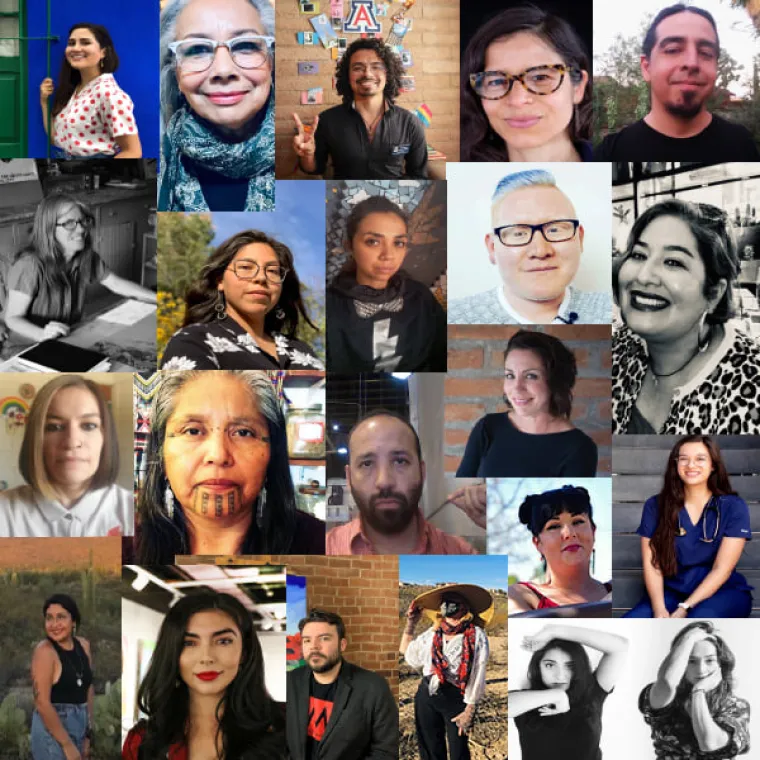
2021 PandemiDiarios Awardees
Shelter in Place Creative Projects
PandemiDiarios on the Border is a microgrant program to support students, academic professionals, and community-based artists and practitioners based in the Arizona-Sonora border region to produce creative works reflecting on human experience of the current COVID-19 pandemic.
The term pandemidiarios comes from blending “pandemic” and “diarios” (diaries). Diarios are where the stories of ourselves are written. They are where we express our frustrations, hopes, and visions for the future. For some it is a therapeutic process, and for others a way to capture the moment or keep a record of day to day life.
In this second round, in alignment with our Fronteridades initiative supported by the Andrew W. Mellon Foundation, we continue to encourage the creative expression of the day to day human moments, experiences, reflections, and creative responses during the COVID-19 pandemic, with emphasis on the experiential intersection of the pandemic with life on the U.S.-Mexico border.
In partnership with University of Arizona Libraries’ Special Collections, we have the unique opportunity to archive digital versions of all creative work supported by this program in the Family and Community Archives. This “digital museum” will be freely available to the public in perpetuity.
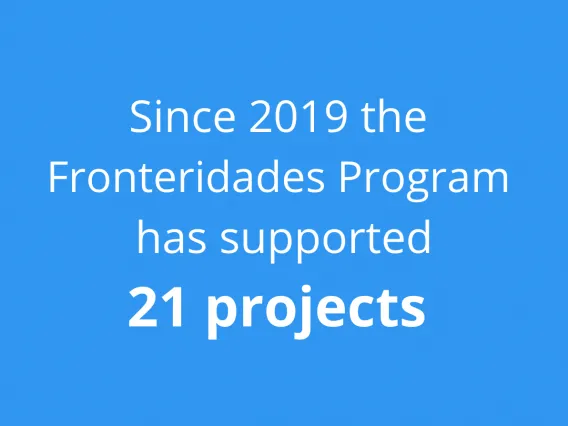
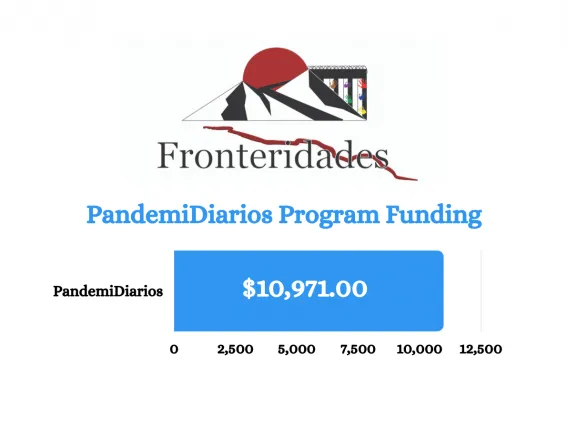
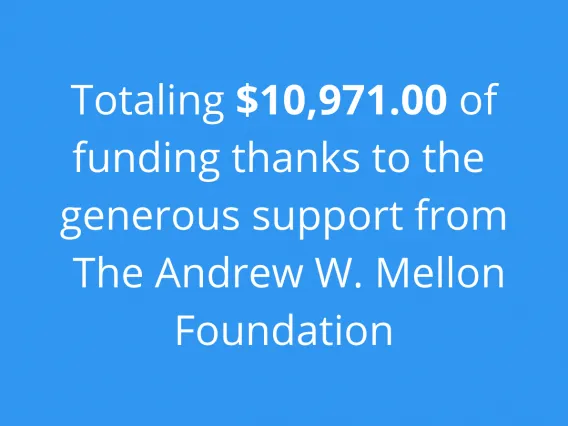
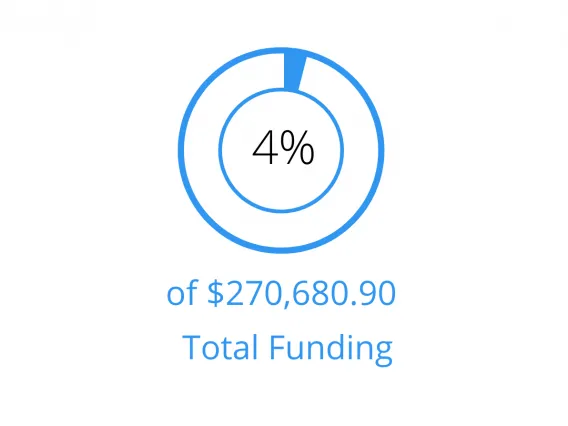
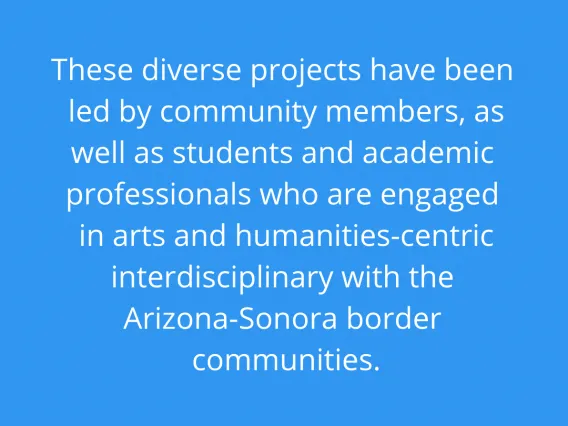
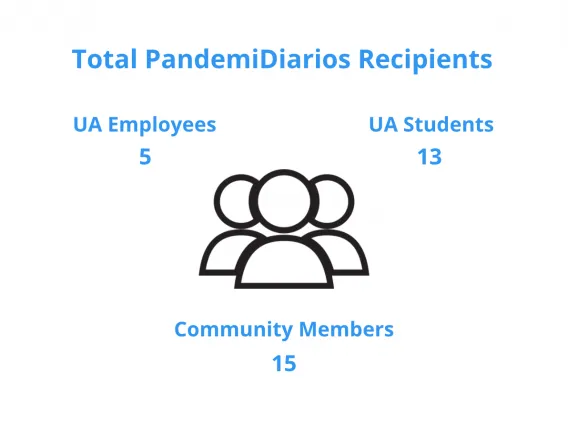
Congratulations 2021 PandemiDiarios awardees:
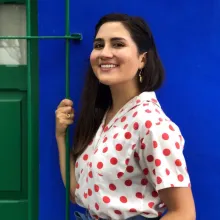
Adriana De La Torre
De La Torre is a Chicana visual artist living in New York City. In collaboration with Southern Arizona non-profit Colibrí Center for Human Rights, the artist designs the bilingual Revista Hermandad zine, written by and for families of disappeared migrants. Submissions include artwork, personal stories, and mental health coping strategies during times of loss. Before and during the COVID-19 pandemic, this zine is mailed and sent digitally to hundreds of families across the U.S., offering a sense of community and support.
Revista Hermandad is a zine written by and for families of disappeared migrants. Even before the pandemic, it was sent via mail to hundreds of families around the U.S. and sent digitally to families across Latin America, but this safe method of sharing is even more important now as it is within the COVID guidelines.
Revista Hermandad · Family & Community Archives · Special Collections Online Exhibits
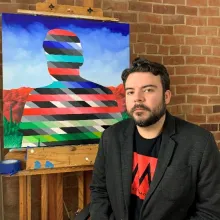
Alejandro Macias
Macias is an artist and Assistant Professor at the University of Arizona School of Art, raised in the Rio Grande Valley, Texas. His work addresses themes of heritage, immigration, ethnicity, which are often contrasted with the theme of “Americanization.” This project involves creating two-dimensional works that navigate the artist’s own Mexican-American identity, physical and sociological divisions along the U.S. / Mexico border, and the ever-shifting contemporary American political landscape within a pandemic.
At the center of this research and this exhibition lies a two-dimensional practice that draws inspiration from many Chicanx activists that have addressed and propelled issues of identity, repression, civil rights, immigration, and cultural misconceptions to a broader audience. The hope to achieve with this crucial and important Tucson debut, is to bring to the forefront a variety of trepidations that navigate around personal Mexican-American identity, physical and sociological divisions along the U.S. / Mexico border, and the ever-shifting contemporary American political landscape within a pandemic.
Everything and Nothing at Once · Family & Community Archives · Special Collections Online Exhibits
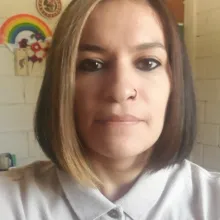
Bianca Valverde
Valverde is a social scientist, feminist activist, and PhD candidate in the field of research studies in health and society at El Colegio de Sonora in Nogales, Sonora. Through her work with the non-governmental organization Verter, AC, Valverde supports harm reduction with individuals who use drugs through activities such as exchanging new syringes, rapid test for HIV, syphilis, and hepatitis C, and counseling. Listening to drug users’ experiences inspired Valverde to undertake this creative project, which involves photo and audio documentation of the daily lives of unhoused drug users on the border, with emphasis on their identity, dignity, and human rights.
Through a camera and a tape recorder, the aim is to tell the stories and realities behind the people that face the reality of the streets, in an environment that often denies them even health services, aggravating their situation. The principle of this project is to respect the identity, dignity, and human rights of these people; a series of photographs is a final product, accompanied by audio recordings that allow expression of daily living, way of life and conditions of people who use drugs and who live on the borderline: space where the wall, inequalities, migration, and even dreams converge.
Hidden Faces of the Pandemic · Family & Community Archives · Special Collections Online Exhibits
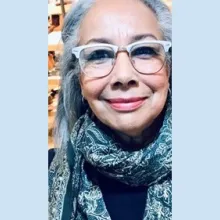
Dr. Bahti is retired faculty at the University of Arizona, where she developed and published new regional frameworks for interpreting Latinx art and photography. Her family history on the U.S.-Mexico border dates from her paternal great-grandfather’s 1901 arrival in Cananea, Sonora and her grandfather’s 1918 transfer to Nogales, Arizona. Through a year of losing friends and family members, Rivas Bahti wrote poetry and painted in watercolor, inspired in part by the work of J.M.W. Turner after the April 1815 eruption of Mount Tambora, in present day Indonesia. Her projects weaves together these reflections as a meditation of solitude, grief, hope, and healing.
This project creates an introduction and captions for a geo-emotive map of isolation in book form drawn from thirty sonnets and small format watercolors dating from the start of national orders to shelter in place in March 2020 to March 2021, one year later. Life slowed swiftly amid state efforts to stem COVID-19 that revealed its virulence among communities of color. Key concerns for all: elder loss in care and on reservations; unequal access to health services, prolonged uncertainty, collective grief. Cascading market and domestic economies with social justice and radical activism also tested citizens in the time of Corona
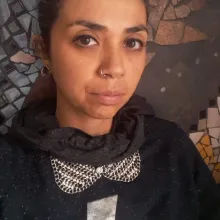
Elena Vega
Vega is a multidisciplinary artist, freelance photographer, and mosaic artist from Nogales, Sonora, Mexico. Her organization Lata Oscura produces creative books, fanzines, and magazines with recycled and inexpensive materials. For this project, Vega will create a coloring book for all ages inspired by the landscapes and daily life in both cities of Nogales, Sonora, and Nogales Arizona. By presenting realistic representations of the border for coloring, new “artists” sheltering at home are invited to experience, imagine, and co-create life and landscape in Ambos Nogales.
This project creates a coloring book inspired by the landscapes of both cities of Nogales Sonora and Nogales Arizona, portraits of the daily life of these two border entities, details of their urban planning and characters of their streets at present and under the new ones will be presented. normalities, images edited in such a way that the reader becomes part of the book, giving these landscapes their own colors, an exercise of recognition of our spaces and of recreation when coloring it, ideal for those times when we look for cognitive activities for which to do creative when we prefer to stay at home.
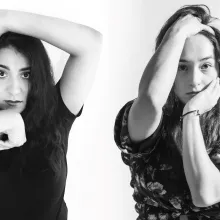
Gloria Flores and André Saucedo
Flores is a PhD Candidate in Latin American Literary and Cultural Studies at the University of Arizona, whose scholarship centers movement as an epistemology and production of knowledge challenging the politics of race and identity in Latin America. Saucedo is a dancer and artistic director, who founded the Texas-based dance company Kúos. Faced with social distancing necessities during the pandemic, Flores and Saucedo dedicated themselves to mastering virtual tools to be able to continue dancing with others from their homes. In this project, they will be producing a manual for virtual dance instruction for dance instructors, dancers, and directors with technical methods to approach the screen and create a sense of community while still being physically distant. In culmination of the project, they will produce a virtual dance performance in a Webinar setting that emphasizes a theater-like experience for spectators and dancers.
The Frame: A Pandemic Virtual Dance aims to portray the stages of the pandemic from beginning to the current in a physical performative manner. We, as transnational border dancers, believe that our work as artists and educators has been affected by this new reality in various ways. As what at first sight might seem as a catastrophic occurrence to our work, we have found that the pandemic and the forced transition to a virtual life have provided us with various tools to keep creating and challenging ourselves as artists. This transnational work aims to portray the positive and negative psychological consequences dancers have faced during this challenging moment.

JD Aragon
Aragon is an indigenous Hopi 2Spirit artist, middle school teacher, YouTube creator, musician, and advocate living with albinism. In his work as a teacher on the Tohono O’odham reservation, he observed firsthand the effects of the pandemic when so many systems of support, from seasonal ceremony to child- and elder-care systems, came to a halt. In this project, Aragon uses photographs, video, and audio interviews to produce a video communicating the stories of O’odham reservation residents during the pandemic.
This video project shows the effects of social distancing due to the COVID-19 pandemic in indigenous communities with testimonials from Tohono O’odham tribal members. Insight on seasonal ceremonies or gatherings that were altered or canceled and how it has ceased the cultural cycle of completing ceremonies pertaining to tribal customs and responsibilities. Describing hardships on maintaining relationships and communication within families across the border, including different communities throughout the reservation. The lack of visiting with elders, rural communities, traveling, childcare, and school difficulties.
HALTED: A Cultural Cycle · Family & Community Archives · Special Collections Online Exhibits
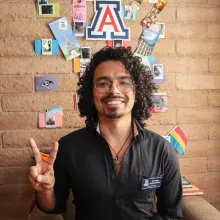
Jhonatan Henao-Muñoz
Henao-Muñoz is a graduate student at University of Arizona, in French Linguistics and Second Language Learning & Teaching. His experience and training in digital humanities inspired the idea to use the podcast medium to create space for diverse underrepresented voices, and to connect different voices with similar experiences. The Podcasteando project will be a set of five episodes, which illustrate diverse realities during the pandemic in the borderlands.
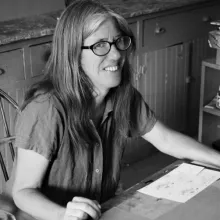
Laurie McKenna
Laurie McKenna is a cross disciplinary artist in Double Adobe, Arizona, whose work examines and engages socio-economic, political, and cultural issues. Her work is deeply attached to labor, place, the border, and American social margins. Coping through a brutal year of loss and stress in 2020, McKenna turned to photography, writing, and drawing for grounding. In this project, these disparate creative moments will be “aggregated” into a cohesive story of this surreal and difficult time.
Aggregate is a material used to build the border wall which commenced in our community right as we began to experience the spread of Covid - 19. At the same time, Black Lives Matter activists and allies were addressing brutality and injustice in the streets. The people that came together all over the country were risking their lives in the streets as voices for the black bodies killed by police. That too is aggregate. This project makes a finished electronic storyboard of these experiences, folding them all together: drawings, writings, illustrations and photos.
Aggregate · Family & Community Archives · Special Collections Online Exhibits
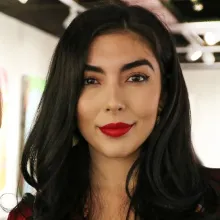
Monica Martinez
Confluencenter Staff
Born and raised in the US-Mexico border area, Martínez-Díaz is a visual artist who uses photography, video, design, and installation to create conceptually based work focused on the hyper normalization of violence in Northern Mexican society. This photobook project uses a series of images to narrate the artist’s experience at her own home and at family member’s homes in the respective border towns of Ciudad Juarez, El Paso, and Nogales. The project aims to understand past and present realities living in a border city the intersecting crises of the COVID-19 pandemic and the drug cartel war.
Feelings are not facts is a photo-book project that serves as a continuation of a prior film project produced in 2018. The photo-book will include a series of images that will narrate my experience during the pandemic at my own home and my family member’s homes in Ciudad Juarez, Nogales and El Paso. The project aims to understand past and current reality living in a border city during a world wide and local crisis: the covid-19 pandemic and the drug cartel war.
Feelings are not Facts · Family & Community Archives · Special Collections Online Exhibits
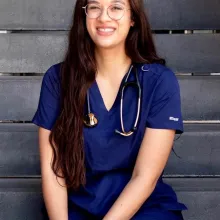
Monique Garcia
Currently working as a nurse, Garcia has observed the unique physical and emotional challenges that the border poses to many of her patients. Combined with the layered challenge of the pandemic, this dance film project involves original choreography, set in the desert, which communicates the felt sense of disconnection, repetition, and hopelessness.
This piece touches on the disconnection and repetition that the pandemic has brought on as well as the disconnection and despair the physical border has created. As the dancer tries to stay connected with their surrounding people, they have a harder time keeping up and can never catch them. With each new group of “others” the main dancer becomes more desperate, as they are losing connection with more groups.
Regression · Family & Community Archives · Special Collections Online Exhibits
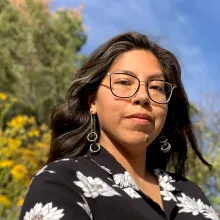
Rachel Espinoza
Espinoza is an Akimel O'odham and Chicana artist from the border region of Big Bend, TX, now living in Tucson, Arizona. Her art, primarily acrylic painting, is influenced by the west Texas landscapes of her youth, as well as the Arizona landscapes of her patrilineal ancestors. This painting project aims to draw inspiration from the style of “Victory Gardens” propaganda of the 1940s, while commenting on the resilience of indigenous foods and the ability of plants to transcend national borders.
This project is a series of digital photographs of an acrylic painting modeled after 1940s Victory Garden propaganda The O’odham people, and other indigenous tribes, have maintained knowledge of farming that extends beyond the national border and into Mexico. We didn’t depend on migrant farmers to come through and tend our gardens for us. All knowledge and homegrown food was, and still is a courtesy we extend to all those traveling through our lands.
Grow It Yourself · Family & Community Archives · Special Collections Online Exhibits
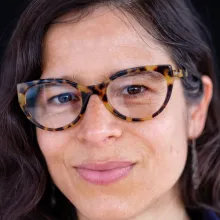
Ruxandra Guidi
Guidi is a journalist born and raised in Caracas, Venezuela, with 20 years of experience reporting across the U.S., Caribbean, South and Central America, and Mexico. During the pandemic, Guidi found sewing and quilting as an effective medicine for anxiety. For this project, Guidi uses quilting as the medium to stitch a new vision for the U.S.-Mexico border region. This quilt asks questions, such as, “What would the line between Ambos Nogales look like if there was no border wall, if animals and humans were free to roam back and forth as needed, if new infrastructure didn’t snake its way along mountainous, rich and complex communities and ecosystems?”
This project will produce a small quilt that envisions a new border —a new shared region— between the U.S. and Mexico. What would the line between Ambos Nogales look like if there was no border wall, if animals and humans were free to roam back and forth as needed, if new infrastructure didn’t snake its way along otherwise mountainous terrain, or rich and complex communities and ecosystems?
Stitching Ambos Nogales · Family & Community Archives · Special Collections Online Exhibits
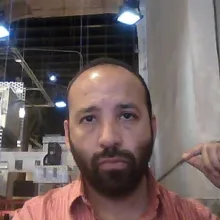
Ramón Méndez
Ramón César Méndez is a scholar and poet originally from El Paso-Ciudad Juárez borderlands, which informs his intellectual endeavors have through a “fronterizo” lens. Set up in three short sections (“I as others”, “Others as I”, “I as my Others to me”) this poetry project is a multi-disciplinary attempt involving bilingual verse complemented by photography and music that bear witness to the complexity of experience in Sonora-Arizona borderland communities during the pandemic. Méndez is a Ph.D. candidate in Latin American Literary and Cultural Studies at the University of Arizona.
One life always bears with it, at its core, a community of lives, even if riddled by contradictions. In times of strife such as these where we must often withdraw physically from even the ones we love, poetry offers language as a realm of possibilities at play that reaches out, touches, and offers contact by way of affect, even if only to ourselves at times, which is already saying: the many lives that make up our own. This project channels memory, displacement, the lingering intimate humming of the Sonoran desert, borders and borderland; in other words, the communities inhabiting the sometimes strident sometimes meditative experience of being with ourselves, which in turn impel us to be aware of others even amid a pandemic.
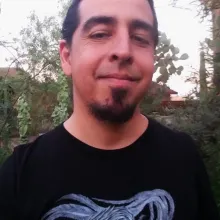
Ruben Moreno
A self-taught Mexican-American artist born and raised in Tucson, AZ, Moreno has exhibited work in El Paso, Los Angeles, San Diego, Phoenix, Mexico and on the International border itself. Moreno’s project illustrates a source of hope for him during the pandemic- the proliferation of Sonoran Desert animals inhabiting new spaces while people stay home. This image will take the form of a portable large scale mural using a recycled billboard banner, for display in multiple locations in the Sonoran region.
This narrative portable public mural highlights something good that has come out of the pandemic. You might have seen how various animals have been spotted in areas they usually don’t traverse or hang out in. This occurred because there were less of us walking and driving about. I found much delight in this and want to paint a mural showing a person in a birdcage with binoculars looking out, in the cage can be an instrument, many books, a laptop, cups and cups of coffee, the kinds of things we quarantined in place with. All about this person and floating in space shows the multitude of Sonoran desert animals, flying, jumping, running. It’s an uplifting image of the individual enjoying the great wilderness from inside.
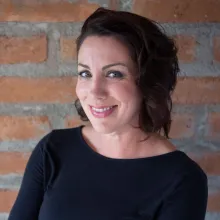
Sara Hubbs
Sara Hubbs is a multi-disciplinary artist with family ties to the Sonoran Desert for more than eight generations. Her project was inspired by the family story that her Great-Great-Grandmother emigrated from Altar, Sonora, MX, to Phoenix during the “Russian Flu” pandemic (1889-95). A paper-based story map will visually locate experiences of the women in Hubbs’ ancestral line across five generations, their movement through the Sonoran Desert, and the occurrence of three global pandemics spanning 131 years.
This project is an exploration of deep time, visualizing the cyclical nature of pandemics. Looking at my own ancestral experience allows me to examine my everyday life during the pandemic, gaining perspective while questioning what can be learned from the archive. It prompts me to think about historical trauma specifically experienced by women and to visualize the many migrations of mothers, from movement across borders to movement in and out of careers and certain sectors of our society.
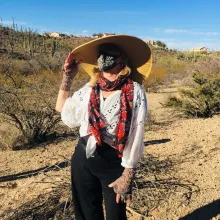
Susana Sedgwick
Harmony Hazard
Sedgwick is a filmmaker, writer, and performance artist, with a background in cultural anthropology. Inspired by conversations over the past year with friends and family members in Ambos Nogales, this project comprises a series of interviews across perspectives of border residents. These interviews will inform a personal essay to authentically communicate the experiential themes of Nogales residents during the COVID-19 pandemic.
The Border Wall and underlying politics were already a divisive factor between Ambos Nogales when Covid19 hit in January 2020. This project interviews inhabitants of the cross border twin cities, Nogales, Sonora and Nogales, Arizona, with the objective of evaluating the impact of the pandemic on daily lives at the border.
Ambos Lados · Family & Community Archives · Special Collections Online Exhibits
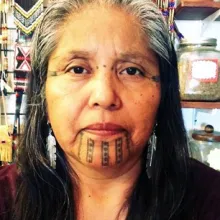
Thomasa Rivas
Rivas is a Tohono O’odham mother, grandmother, and great-grandmother, whose family has lived at Ali Chugk Community (Menegers Dam) “forever;” since before the Tohono O’odham Nation and reservation, Mexico, or the United States were created. Rivas’ family continues to follow the O’odham him:dag (traditional worldview), including participation in summer ceremonies which require travel into Mexico, which has become more difficult with recent restrictions. For this project, Rivas will make traditional Tohono O’odham (hu’uli) grandmother dolls, which offer remembrance, comfort, security, spiritual protection, and love. These dolls serve to remind us that we are not alone- as the artist states, “Our grandmothers create a never-ending circle around us, which encompasses our spirituality, our power, and our physical being.”
These “dolls” are hand-made, the love, protection, and comfort they provide is universal; we meet grandmothers everywhere. In fact, we carry our grandmothers DNA in our mitochondria; truly, we are never alone. In spite of COVID-19 orders to shelter in place, the strength you carry in these times are the legacy of ALL your grandmothers’ strength encoded in your very DNA."
N:wa Twe' Mac (They Are With Us) · Family & Community Archives · Special Collections Online Exhibits
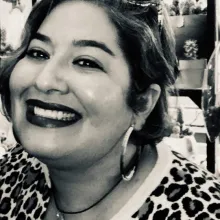
Verónica Hirsch
Founded in 2019, the HONOR (Healing Our Nations, Offering Resiliency) Collective is an Indigenous-led network within Southern Arizona designed to strengthen relationships, resiliency and healing practices among Indigenous communities. HONOR members represent Tohono O’odham, Hopi, Kickapoo, Macehual, Mississippi Band of Choctaw, Yaqui, Zuni, Navajo, and Chiricahua Apache Native Nations, as well as various Mexican Indigenous lineages. Members provide mutual aid; conduct community outreach; support Indigenous economy; and convene support circles. HONOR cites countless epidemics witnessed and weathered by Indigenous people living within Tohono O’odham traditional homelands and current Pascua Yaqui tribal lands, including settler colonial genocide and introduction of foreign diseases, continued incidents of Missing and Murdered Indigenous People (MMIP), and now the COVID-19 pandemic. For this project, HONOR Collective members will document and celebrate their efforts by creating a short film that highlights their Indigenous methods of caretaking and ceremony for resilience.
This project is consists of a video of Indigenous people living within these Tohono O’odham traditional homelands and current Pascua Yaqui tribal lands have witnessed and weathered countless epidemics. From settler colonial genocide and introduction of foreign diseases, to the current epidemic of Missing and Murdered Indigenous People (MMIP), and now in the midst of this global COVID-19 pandemic, Native people within this Arizona-Sonora, so-called “borderlands” region have drawn upon their cultural values of reciprocity, shared community responsibility, and resource redistribution (mutual aid) to withstand this latest threat to our very survival.
We are Survivors: Indigenous Pandemic Resiliency & Community Restoration
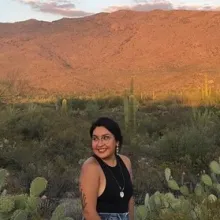
Yanely Rivas
Yanely Rivas is a Xicana printmaker, visual artist, and organizer with ancestral roots in Michoacán, Mexico, whose art and life are deeply influenced by themes of migration, restriction of movement, colonization, indigeneity, spirituality, and healing. This illustration project will focus on specific Sonoran Desert mountains near the international border, exploring reciprocal relationship with land, traditional O’odham stewardship practices, and navigating the desert as a migration route.
In the desert, being able to orient yourself can be the difference between having the ability to save your own life or being disappeared. This project finds inspiration in the resilience of people plants, animals, and the desert itself over centuries.”Por su Conocer” focuses on key desert landscapes and mountains along migrant routes the have been re-named for the purpose of orientation and self preservation. The hope is to do research on the role of these land sites have played/play for the traditional stewards of these lands, the Tohono O’odham. Some mountains may include: La Abuja, El Buddah, Los Serrucho, La banana, La Ballena. Overall, the purpose of this project is to help restore the sacred reciprocal relationship to the land and potentially serve as an educational tool for folks navigating the desert.
Por su Conocer (Orientation: Montañas en el Desierto) · Family & Community Archives

